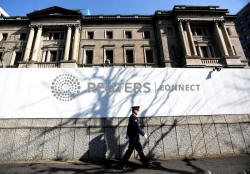Business spending plans may hold key to Bank of Japan's
next move
 Send a link to a friend
Send a link to a friend
 [March 06, 2020] By
Leika Kihara [March 06, 2020] By
Leika Kihara
TOKYO (Reuters) - Capital expenditure, one
of the few bright spots in the fragile Japanese economy, will be a key
focus for the Bank of Japan as it weighs options to reduce the fallout
from the widening coronavirus outbreak, sources familiar with its
thinking say.
That means any measures the central bank will take in coming months will
be aimed at preventing a sharp deterioration in business confidence and
investment, they said.
With a key corporate sentiment survey due out in April, the BOJ may take
a two-step approach: adopt stop-gap steps at its next meeting on March
18-19 to deal with the immediate hit to firms from the virus, and
consider bolder monetary measures next month, they say.
Such a strategy would buy the BOJ more time to assess the scale of
damage to the economy from the epidemic, and ensure it makes the most
out of its dwindling policy ammunition. The BOJ is taking a cue from the
markets' tumble after the Fedís emergency interest rate cut this week
that simple rate cuts may not do much to turn around markets at this
stage.

"There's not much data available to gauge the impact of the virus in
March," said one of the sources.
"More fundamental discussions on the economy and price momentum may have
to wait until April," the source said on condition of anonymity due to
the sensitivity of the matter, a view echoed by two other sources.
Separate sources have told Reuters the BOJ may take steps this month to
ensure firms do not face a financial squeeze before the end of the
current fiscal year, but gave no specifics.
There is no consensus within the central bank on whether further steps
will be needed. That will largely depend on how financial markets move
ahead of its March 18-19 rate review. Expectations of more easing by the
U.S. Federal Reserve have undermined the dollar and pushed up the yen,
which policymakers closely monitor.[FRX/]
If markets grow even more volatile and severely hurt business
confidence, the BOJ may take steps in March such as increasing its
purchases of exchange-traded funds (ETFs), analysts say.
The BOJ will also eye government measures to deal with the virus, due to
be announced on March 10, to see what complementary action it may take,
the sources said.
For now, many BOJ policymakers see the coronavirus impact as transitory
and expect Japan's economy to rebound in the latter half of this year,
even if bodies such as the IMF are slashing global growth forecasts.
[to top of second column] |

A security guard walks
past in front of the Bank of Japan headquarters in Tokyo, Japan
January 23, 2019. REUTERS/Issei Kato/File Photo

Their biggest concern is that virus fears will prompt firms to slash spending,
which been a rare bright spot in the economy as firms continue to invest in
innovation and automation to cope with a labour crunch.
Even as manufacturers' business morale sank to a seven-year low due to the Sino-U.S.
trade war, big firms still planned to increase capital expenditure by a solid
6.8% in the year ending in March 2020, the BOJ's "tankan" quarterly survey for
December showed.
Non-manufacturers, on the other hand, have been far more confident about
business prospects, but many firms in the services sector are now facing a
collapse in tourism and consumption as the virus spreads. Japan now has over
1,000 cases and has reported 12 deaths.
If firms are reluctant to ramp up spending, it would undermine the BOJ's
scenario that robust capital expenditure will offset the hit from prolonged
weakness in exports.
That would cast doubt on the BOJ's argument that solid domestic demand will
underpin Japan's recovery, the sources said, putting it under pressure to take
bolder easing measures.
The next tankan survey, due on April 1, will be crucial in determining whether
the BOJ's scenario stands.
Waiting for that data could focus investors' attention more sharply on the BOJ's
subsequent rate review on April 27-28, when the board produces fresh quarterly
growth and inflation forecasts.

The new projections will include for the first time the board's forecast for the
year when Governor Haruhiko Kuroda's term expires.
"If the virus is not contained by the time the BOJ meets in April, the whole
landscape on Japan's economic outlook will change," a second source said. "The
BOJ will need to brace for that risk."
(Reporting by Leika Kihara; Editing by Kim Coghill)
[© 2020 Thomson Reuters. All rights
reserved.] Copyright 2020 Reuters. All rights reserved. This material may not be published,
broadcast, rewritten or redistributed.
Thompson Reuters is solely responsible for this content. |